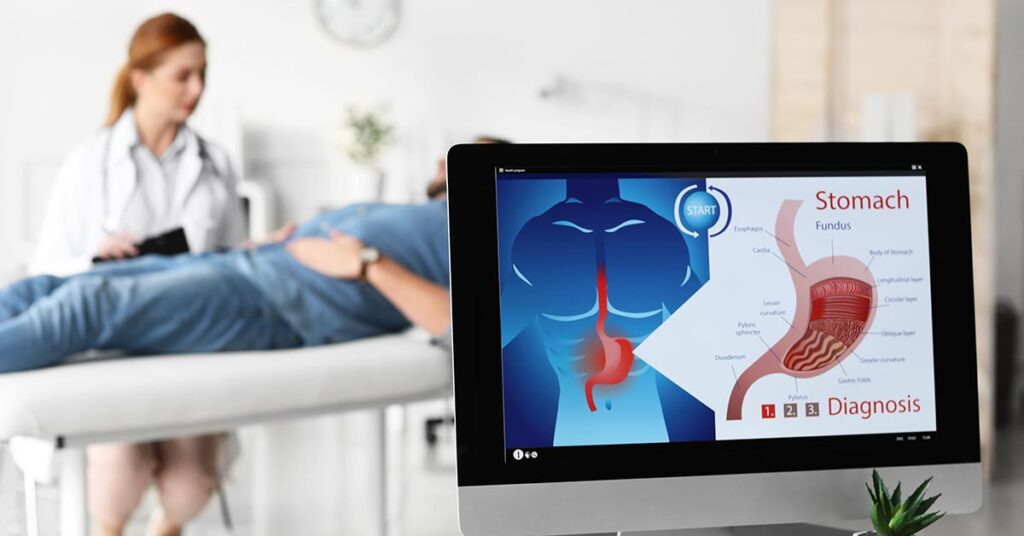You may have heard the term Gastrointestinal as it refers to an internal system or disease before, but do you know how much of the human body is included in that system? The gastrointestinal system includes the mouth, pharynx (throat), esophagus, stomach, small intestine, large intestine, rectum, and anus. It also includes the auxiliary organs and functions such as salivary glands, liver, gallbladder, and pancreas.
Each of these assists by making digestive juices and enzymes that help the body digest food and liquids. The NIH estimates that between 60 and 70 million Americans have at least one GI disorder. Different conditions and ailments can characterize the gastrointestinal disease. The team of gastrointestinal doctors at Family Medicine Austin receives an ever-growing number of patients with gastrointestinal concerns. We can provide you with an accurate diagnosis and treatment plan to reduce discomfort and alleviate symptoms.
Given that this is such a complex system, the gastrointestinal disease can be characterized by so many different conditions and ailments. The team at Family Medicine Austin receives an ever-growing number of patients with gastrointestinal concerns. We can provide you with an accurate diagnosis and treatment plan to reduce discomfort and alleviate symptoms.

GI disorders are diseases and conditions that affect the digestive system. Numerous illnesses and conditions can damage the digestive tract. Each of them can affect digestion and our overall health.
GI disorders include chronic conditions such as Crohn’s disease, irritable bowel syndrome (IBS), celiac disease, ulcerative colitis, inflammatory bowel disease, or liver disease. These issues require specialized care to maintain a healthy digestive tract. Constipation, viral gastroenteritis, and food poisoning are some of the most prevalent forms of GI illnesses.
Although the list of potential disorders and disease extends well beyond what we have included below, the following are some of the most common gastrointestinal disorders that patients are diagnosed with. If you are unsure or have not yet been expertly diagnosed, you must seek professional help to correct your condition. Gastrointestinal disease can quickly escalate, causing serious symptoms and side effects. GI diseases and disorders include:

There are numerous causes of gastrointestinal disorders. Some of them are listed below:
Low fiber diet: Fiber is an indigestible carbohydrate; thus, consuming enough of it is crucial for keeping a healthy digestive tract. It induces satiety and assists in the digestion of certain foods. The beneficial bacteria in the large intestine fine fibers to be a fantastic source of nutrition. A diet low in fiber impacts gut health.
Anxiety: Stress and anxiety not only affect your mental health, but they also affect the health of your digestive system, specifically the gut bacteria. Several digestive disorders, including appetite loss, inflammation, bloating, cramps, and alterations in the gut microbiome, have been associated with stress.
Inadequate water intake: Water is vital for digestive health because it helps cleanse the entire gastrointestinal system. For instance, drinking can reduce constipation by softening the stool. In addition, water is well-known for facilitating digestion by making it easier for the body to break down food. It facilitates the body’s absorption of nutrients.
Excessive consumption of milk and dairy products: Milk and cheese are high in fats and proteins that are difficult to digest, thus exacerbating inflammation. Consuming excessive dairy products can lead to bloating, gas, constipation, and stomach cramps.
Aging: It increases the likelihood of digestive problems. Our digestive glands become less active as we age. It can influence the movement of our intestines, increasing our susceptibility to digestive illnesses.
Genetics/Family History: Hereditary susceptibility plays a role in numerous immunological and autoimmune digestive disorders. Some individuals may acquire GI illness due to one or more of these genetic variants. Ulcerative colitis, Crohn’s disease, celiac disease, and certain liver illnesses can all be inherited.

The gastrointestinal tract can be broken down into the upper and lower portions, each with its unique conditions and diseases. Depending on how far along the tract you go, different organs and tissues can contribute to or be affected by diseases. Find a list of possible conditions and symptoms below:
At Family Medicine Austin, gastrointestinal specialists have access to a range of testing methods to diagnose your gastrointestinal condition accurately. Our highly proficient gastrologists utilize a combination of lab tests and imaging to rule out the most common causes of these symptoms and gain insight into the cause. Lab tests include:
Abdominal Ultrasound can be used to view things like gallstones, other dangerous and painful formations, or blockages.

Given the wide range of potential conditions and causes, treatment will vary greatly depending on what you are experiencing. At Family Medicine Austin, we care for patients with conservative treatment in our clinic, or if needed, a referral can be given to a specialized gastroenterology practice for additional workup and symptom management.
If you are suffering from one or more of the symptoms above, you need to have your condition assessed by a health professional. Ensuring your gastrointestinal tract is functioning properly is an integral part of your general health. Call our offices to speak with a member of our team or schedule a consultation online with the professionals at Family Medicine Austin today